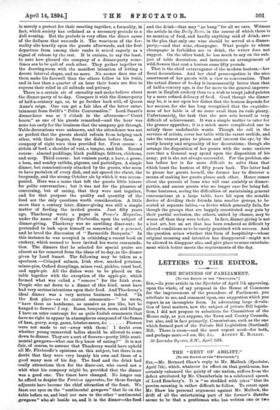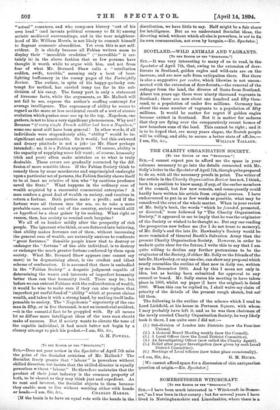THE "RENT OF ABILITY."
[To maa EDITOR OF THE " SPZCTLTOR:] SIR,—Mr. Bernard Shaw's reply to Mr. Mallock (Spectator, April 7th), which, whatever its effect on that gentleman, has certainly enhanced the gaiety of one nation, suffers from the defect attributed by Mr. Chamberlain to a celebrated speech of Lord Rosebery's. It is " so studded with jokes " that its precise meaning is rather difficult to follow. To retort upon Mr. Shaw his personal argument against Mr. Mallock, the drift of all the entertaining part of the former's diatribe seems to be that a gentleman who has written one or two • ' actual " romances, and who composes history "out of his own head " (and invents political economy to fit it) among artistic mediaeval surroundings, and in the near neighbour- hood of Mr. William Morris. is not likely to commit himself to flagrant economic absurdities. Yet even this is not self- evident. It is chiefly because all Fabian writers seem to display their " incredible erudition " (" incredible " it cer- tainly is) in the above fashion that so few persons have thought it worth while to argue with him, and not from fear of what Mr. Bernard Shaw calls a " retribution sudden, swift, terrible," meaning only a bout of bear- fighting buffoonery in the roomy pages of the Fortnightly Review. The author, in spite of his happy-go-lucky con- tempt for method, has carried irony too far in the sub- division of his essay. The funny part is only a statement of tiresome facts, while the arguments, as Mr. Mallock will not fail to see, express the author's scoffing contempt for average intelligence. The supremacy of ability he seems to regard as the more or less accidental result of a sort of atomic evolution which pushes some one up to the top. .Napoleon, one gathers, is not to him a very significant phenomenon. Why not? Because "if every single French soldier had been a Napoleon," some one must still have been general ! In other words, if all individuals were stupendously able, " ability " would be in- significant and unnoticeable. So it would ; but this awkward and dreary platitude is not a joke (as Mr. Shaw perhaps intended); no, it is a Fabian argument. Of course, ability is the capacity of supplying some felt want ; of course, humanity (rich and poor) often make mistakes as to what is truly desirable. These errors are gradually corrected by the dif- fusion of more sensible ideas. If the Fabian Society think to remedy them by some murderous and unprincipled onslaught upon a particular set of persons, the Fabian Society shows itself to be at least no relative of him who " by cautious prudence saved the State." What happens in the ordinary case of wealth acquired by a successful commercial enterprise ? A man confers a great deal of wealth on society, and receives in return a fortune. Both parties make a profit ; and if the fortune were all thrown into the sea, or, to take a more probable case, carried out of the country, society would still ex hypothesi be a clear gainer by its making. What right or reason, then, has society to rescind such bargains ?
We all of us banker mildly after the prosperity of rich people. The ignorant who think, or are flattered into believing, that ability makes fortunes out of them, without increasing the general sum of wealth, are naturally anxious to confiscate " great fortunes." Sensible people know that to destroy or endanger the " fortune" of the able individual, is to destroy or endanger the much greater fortune conferred by them upon society. What Mr. Bernard Shaw appears (one cannot say more) to be dogmatising about, is the crudest and idlest scheme of confiscation. It is assumed that there is embodied in the "Fabian Society" a, despotic judgment capable of determining the wants and interests of imperfect humanity better than can that humanity itself. There may be; but before we can entrust Fabians with the redistribution of wealth, it would be wise to make sure if they can also replace that imperfect yet useful fund of " ability " which at present claims wealth, and takes it with a strong hand, by making itself indis- pensable to society. The " Napoleonic " superiority of the one man in fifty, or in five thousand, is not an immaterial accident, —it is the essential fact to be grappled with. By all means let us diffuse more intelligent ideas of the uses man should make of success. But if society wants to elevate the tone of the capable individual, it had much better not begin by a clumsy attempt to pick his pocket.—I am, Sir, &c.,
G. H. POWELL.



































 Previous page
Previous page